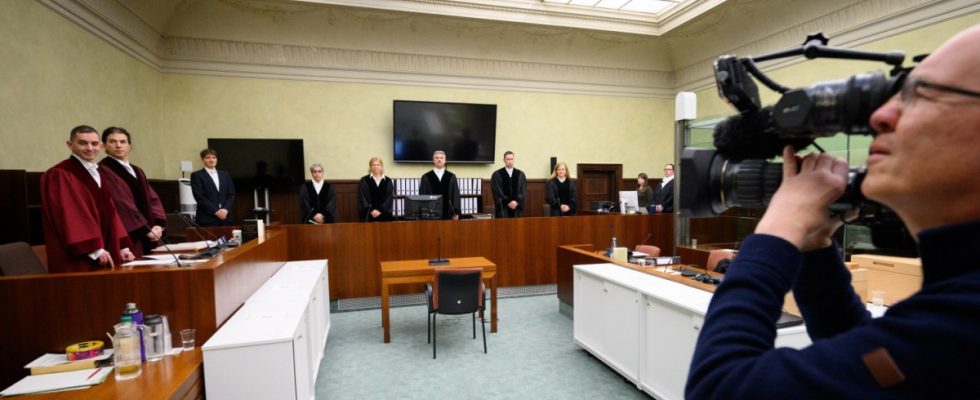Carsten L. wants to clarify something. Until now he has always sat quietly in a glass box, but now he steps forward to the microphone for the first time. L. has been on trial in Berlin since December. The accusation: treason. The employee of the Federal Intelligence Service (BND) is said to have sold state secrets to Russia – including positions of Western weapon systems in Ukraine and details about how the West monitors a communications app from the Wagner mercenary militia. He was arrested shortly before Christmas 2022. Since then, Carsten L. has remained silent about the allegations. But this Wednesday he wants to present his version of events to the court.
However, he leaves the foreword to his defender Johannes Eisenberg. His explanation could be summarized briefly and succinctly: The defendant only wanted to help the Federal Republic.
The case is as explosive as it is complex. The Federal Prosecutor’s Office accuses the 53-year-old of having leaked the secret documents to the Russian domestic secret service FSB via a messenger, businessman Arthur E. He is also charged here in Berlin. This Arthur E., 33 years old and with a colorful portfolio ranging from diamond mines to cryptocurrencies, is also the prosecution’s main witness.
Arthur E. already testified in court in January. He and L. know each other, as far as their descriptions agree, through a mutual acquaintance from Weilheim in Upper Bavaria. According to E., contact with sinister circles in Moscow came about by chance through a businessman friend from Russia. It was BND man Carsten L. who is said to have said that he had something “for Russia, for your friend.”
L. calls the witness Artur E. a “talker”
E. said that he flew to Moscow with the documents in the belief that he was ultimately working for the BND and handed them over to two Russians there. Only later did he understand that they were FSB agents. They put pressure on him to deliver more. Which he then did. This is, broadly speaking, It’s version.
L’s version is that Arthur E. is a “talker.” In the L. family they only called him “blabla,” says lawyer Eisenberg. Someone who talks a lot but doesn’t deliver. According to his account, BND man L. hoped that E. could use his contacts to help him with one of his official tasks. Not when it comes to betraying the BND, but on the contrary: when it comes to maintaining the security of the intelligence service.
At the time in question, in the summer and fall of 2022, Carsten L. was officially working in a dual role at the BND. He was still working in the “Technical Reconnaissance” department, which is responsible, for example, for monitoring foreign army radio. At the same time, he was already taking over tasks from his new position, which he was soon to take on – as head of department for personnel security issues. At that time, L’s lawyer explains, there was a suspicion that a BND employee in Moscow was possibly being put under pressure by Russian secret services and was collaborating with them. Arthur E., in turn, claimed that he knew someone in Moscow security circles who knew who was on the Russians’ “payroll” in Western embassies.
L. sits in a dark suit between his defense lawyers as he explains to the presiding judge Detlev Schmidt how it went. E. told him about his illustrious contacts in Africa – the diamond business. “High-ranking military officials, state presidents,” L remembers. That’s exactly the kind of informant the BND is looking for: “People who get around, who have contacts. People who have an ass in their pants.” That’s why he officially recruited him as an informant. They met often, mostly in bars, sometimes in the Artemis brothel in Berlin.
“I wasn’t thrilled about that”
On the evening of the brothel visit, E. let it be known that he had that same contact in Russia. Then he thought, says Carsten L., that his new informant should tap into his source. Arthur E. flew to Moscow twice in the fall of 2022 with this alleged order. But he didn’t bring anything with him, says L.: “I wasn’t thrilled about it.”
This Wednesday is a lot about timing, about meetings at which, according to the prosecution, treason documents were handed over – which, according to L., either didn’t take place or took place completely differently than the federal prosecutor and his co-defendant say. The chairman also tends to limit his questions to such details. The survey lasts almost three and a half hours in total, and L. only sometimes becomes impatient when questions seem unnecessary. Arthur E. sits behind him in the glass box and shakes his head almost constantly.
In the morning, Carsten L’s defense attorney concluded his statement with an assurance: “The defendant did not want to and did not betray the BND.” L. wants to step out of the glass box and talk on Thursday too. Then the Attorney General’s prosecutors also want to ask him questions.

